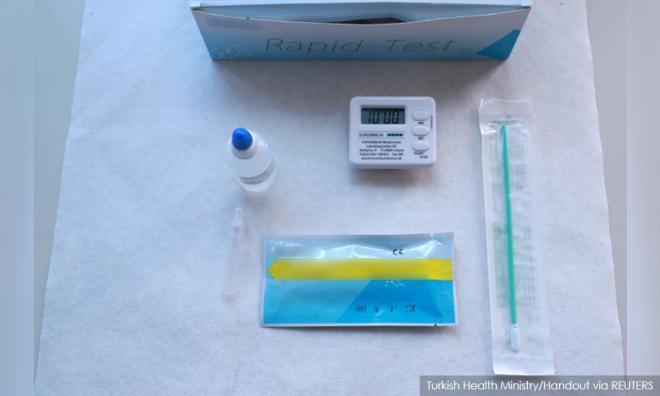
CORONAVIRUS | The Health Ministry is giving priority to East Malaysia in its distribution of the South Korean-made antigen rapid-test kits (RTKs) which are expected to arrive in several batches starting this Friday as part of the Health Ministry's Covid-19 battle.
Health director-general Dr Noor Hisham Abdullah said they are focusing on the use of the RTKs in Sabah and Sarawak to overcome logistical issues in testing Covid-19 samples from the two states.
"I want to inform that maybe by Friday, we will start receiving the first batch of the Korean-made RTKs which had seen a delay. About 50,000 units would be received and we will give priority to Sabah and Sarawak.
"These RTKs may be more suitable to be used there, as it gives an advantage in terms of time consumed to test samples and can be done at the point of care," he told a press conference in Putrajaya today.
RTK is a diagnostic tool that can be used to test the presence of the Covid-19 antigen in a human sample. It is a relatively quicker and cheaper method to detect a positive case compared to the reverse-transcription-polymerase chain reaction (RT-PCR) tests that have to be done in a laboratory.
Currently, the MOH is depending on RT-PCR tests to detect positive Covid-19 cases in the country through a total of 44 laboratories nationwide.
However, there are only several laboratories in East Malaysia. As an example, Noor Hisham said there are only four labs in Sarawak that conduct RT-PCR tests, including one that is operated by the Universiti Malaysia Sarawak (Unimas).
As of this week, the 44 laboratories can do a total of 16,635 RT-PCR tests a day, and MOH is looking to increase it to 22,000 soon with the installation of two BGI automated processing system at its Institute for Medical Research (IMR) in Kuala Lumpur and the Public Health Laboratory in Kota Kinabalu, Sabah.
Noor Hisham had previously said they were hoping to increase the number of tests when the RTK arrives and would embark in mass testing activities.
It was reported that MOH has placed an order for 200,000 units of the RTK produced by SD Biosensor Inc, which is a South Korean company.
The ministry had placed the order early this month as tests have found the RTK brand to have high sensitivity and specificity.
According to Noor Hisham, besides the RTKs, MOH is also going to place two biosafety cabinets at the Kuala Lumpur International Airport, which would allow for RT-PCR tests to be done there.
This, he added, would enable the health authority to conduct detection tests on samples taken from passengers who arrive at the airport, including transit passengers.
Meanwhile, on another matter, Noor Hisham said MOH is looking at easing the workload of its frontliners and Covid-19 hospitals as many cases had started showing a declining trend.
This includes reviewing the work schedule of frontliners to give them rest.
He said the ministry would also start shifting Covid-19 patients who are at early stages of infection from Kuala Lumpur Hospital (HKL) to a temporary Covid-19 facility in MAEPS, Serdang.
This is to allow the hospital to focus on other healthcare services which had been put on hold since the outbreak started.
"Those who are positive but do not show any symptoms or mild symptoms would be transferred to the MAEPS hospital for treatment, while patients who are at Stage 4 and 5 would be sent to Sungai Buloh Hospital.
"This would free up HKL so that it can focus on other activities," Noor Hisham said.
Asked on an allegation that those under quarantine at an isolation centre in Kempas, Johor Baru having to share toilets with positive Covid-19 patients, Noor Hisham said they are going to investigate the claim.
However, he said the allegation could have stemmed from a misunderstanding as it is a practice by MOH to isolate all positive patients from other patients. - Mkini


No comments:
Post a Comment
Note: Only a member of this blog may post a comment.